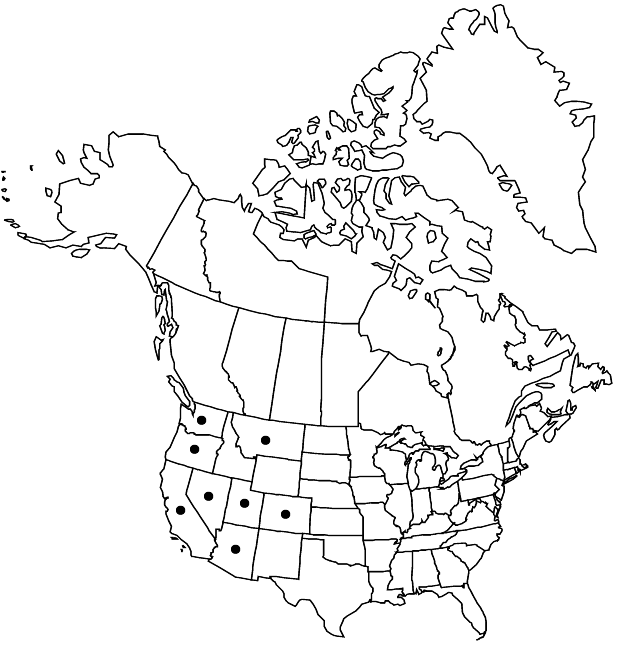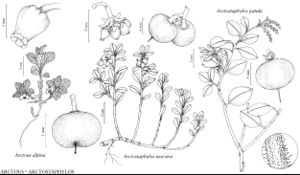Difference between revisions of "Arctostaphylos patula"
Pittonia 2: 171. 1891 ,.
FNA>Volume Importer |
imported>Volume Importer |
||
| (6 intermediate revisions by 2 users not shown) | |||
| Line 7: | Line 7: | ||
}} | }} | ||
|common_names=Greenleaf manzanita | |common_names=Greenleaf manzanita | ||
| + | |special_status={{Treatment/ID/Special_status | ||
| + | |code=F | ||
| + | |label=Illustrated | ||
| + | }} | ||
|basionyms= | |basionyms= | ||
|synonyms={{Treatment/ID/Synonym | |synonyms={{Treatment/ID/Synonym | ||
|name=Arctostaphylos acutifolia | |name=Arctostaphylos acutifolia | ||
|authority=Eastwood | |authority=Eastwood | ||
| − | }}{{Treatment/ID/Synonym | + | |rank=species |
| + | }} {{Treatment/ID/Synonym | ||
|name=Arctostaphylos parryana var. pinetorum | |name=Arctostaphylos parryana var. pinetorum | ||
|authority=(Rollins) Wieslander & B. Schreiber | |authority=(Rollins) Wieslander & B. Schreiber | ||
| − | }}{{Treatment/ID/Synonym | + | |rank=variety |
| + | }} {{Treatment/ID/Synonym | ||
|name=Arctostaphylos patula var. coalescens | |name=Arctostaphylos patula var. coalescens | ||
|authority=W. Knight | |authority=W. Knight | ||
| − | }}{{Treatment/ID/Synonym | + | |rank=variety |
| + | }} {{Treatment/ID/Synonym | ||
|name=Arctostaphylos patula subsp. platyphylla | |name=Arctostaphylos patula subsp. platyphylla | ||
|authority=(A. Gray) P. V. Wells | |authority=(A. Gray) P. V. Wells | ||
| − | }}{{Treatment/ID/Synonym | + | |rank=subspecies |
| + | }} {{Treatment/ID/Synonym | ||
|name=Arctostaphylos platyphylla | |name=Arctostaphylos platyphylla | ||
| − | |authority= | + | |authority= |
| + | |rank=species | ||
}} | }} | ||
|hierarchy=Ericaceae;Ericaceae subfam. Arbutoideae;Arctostaphylos;Arctostaphylos patula | |hierarchy=Ericaceae;Ericaceae subfam. Arbutoideae;Arctostaphylos;Arctostaphylos patula | ||
| Line 38: | Line 47: | ||
|elevation=400-3000 m | |elevation=400-3000 m | ||
|distribution=Ariz.;Calif.;Colo.;Mont.;Nev.;Oreg.;Utah;Wash.;Mexico (Baja California). | |distribution=Ariz.;Calif.;Colo.;Mont.;Nev.;Oreg.;Utah;Wash.;Mexico (Baja California). | ||
| − | |discussion=<p>Arctostaphylos patula is abundant and widespread in western North America as a dominant in montane chaparral, pine forest gaps, and high-elevation arid-steppe and canyon-land environments. Populations throughout western North America are characterized by twigs and inflorescence parts covered with relatively short hairs tipped with golden glands. In the central to northern Sierra Nevada, mixed with the widespread form are individuals that are eglandular and have a cover of relatively short, whitish hairs on the stems and inflorescences. Similarly, throughout most of its range, A. patula is nonsprouting after fire, and in areas characterized by winter snow cover it layers and creates broad, low mounds. In much of California, it typically sprouts after fires from obscure and flattened burls, forming circles of erect sprouts.</p> | + | |discussion=<p><i>Arctostaphylos patula</i> is abundant and widespread in western North America as a dominant in montane chaparral, pine forest gaps, and high-elevation arid-steppe and canyon-land environments. Populations throughout western North America are characterized by twigs and inflorescence parts covered with relatively short hairs tipped with golden glands. In the central to northern Sierra <i>Nevada</i>, mixed with the widespread form are individuals that are eglandular and have a cover of relatively short, whitish hairs on the stems and inflorescences. Similarly, throughout most of its range, <i>A. patula</i> is nonsprouting after fire, and in areas characterized by winter snow cover it layers and creates broad, low mounds. In much of California, it typically sprouts after fires from obscure and flattened burls, forming circles of erect sprouts.</p> |
|tables= | |tables= | ||
|references= | |references= | ||
| Line 47: | Line 56: | ||
-->{{#Taxon: | -->{{#Taxon: | ||
name=Arctostaphylos patula | name=Arctostaphylos patula | ||
| − | |||
|authority=Greene | |authority=Greene | ||
|rank=species | |rank=species | ||
| Line 61: | Line 69: | ||
|publication title=Pittonia | |publication title=Pittonia | ||
|publication year= | |publication year= | ||
| − | |special status= | + | |special status=Illustrated |
| − | |source xml=https:// | + | |source xml=https://bitbucket.org/aafc-mbb/fna-data-curation/src/2e0870ddd59836b60bcf96646a41e87ea5a5943a/coarse_grained_fna_xml/V8/V8_771.xml |
|subfamily=Ericaceae subfam. Arbutoideae | |subfamily=Ericaceae subfam. Arbutoideae | ||
|genus=Arctostaphylos | |genus=Arctostaphylos | ||
Latest revision as of 22:46, 5 November 2020
Shrubs, erect or mound-forming, 1–3 m; burl usually absent, sometimes flat, obscure; twigs usually densely short-hairy with golden glands on tips of hairs, rarely short white-hairy and eglandular. Leaves: petiole 7–15 mm; blade bright green (lightly gray-green if short-hairy), shiny, widely ovate to orbiculate, 2.5–6 × 1.5–4 cm, base rounded, truncate, or slightly lobed, (not clasping), margins entire, plane, surfaces smooth, glabrous or, rarely, short-hairy. Inflorescences panicles, 2–8-branched; immature inflorescence pendent, branches spreading, axis 1.5–3 cm, 1+ mm diam., hairy with golden glands on tips of hairs or short-hairy and eglandular; bracts appressed with incurved tips, scalelike, deltate, 4–6 mm, apex acuminate, surfaces usually densely tomentose with golden glands on tips of hairs, rarely short white-hairy and eglandular. Pedicels 2–7 mm, glabrous or white-hairy. Flowers: corolla mostly pink, conic to urceolate; ovary glabrous or white-hairy. Fruits depressed-globose, sometimes subglobose, 7–10 mm diam., glabrous. Stones distinct. 2n = 26.
Phenology: Flowering late spring–early summer.
Habitat: Mountain chaparral and forests
Elevation: 400-3000 m
Distribution

Ariz., Calif., Colo., Mont., Nev., Oreg., Utah, Wash., Mexico (Baja California).
Discussion
Arctostaphylos patula is abundant and widespread in western North America as a dominant in montane chaparral, pine forest gaps, and high-elevation arid-steppe and canyon-land environments. Populations throughout western North America are characterized by twigs and inflorescence parts covered with relatively short hairs tipped with golden glands. In the central to northern Sierra Nevada, mixed with the widespread form are individuals that are eglandular and have a cover of relatively short, whitish hairs on the stems and inflorescences. Similarly, throughout most of its range, A. patula is nonsprouting after fire, and in areas characterized by winter snow cover it layers and creates broad, low mounds. In much of California, it typically sprouts after fires from obscure and flattened burls, forming circles of erect sprouts.
Selected References
None.
